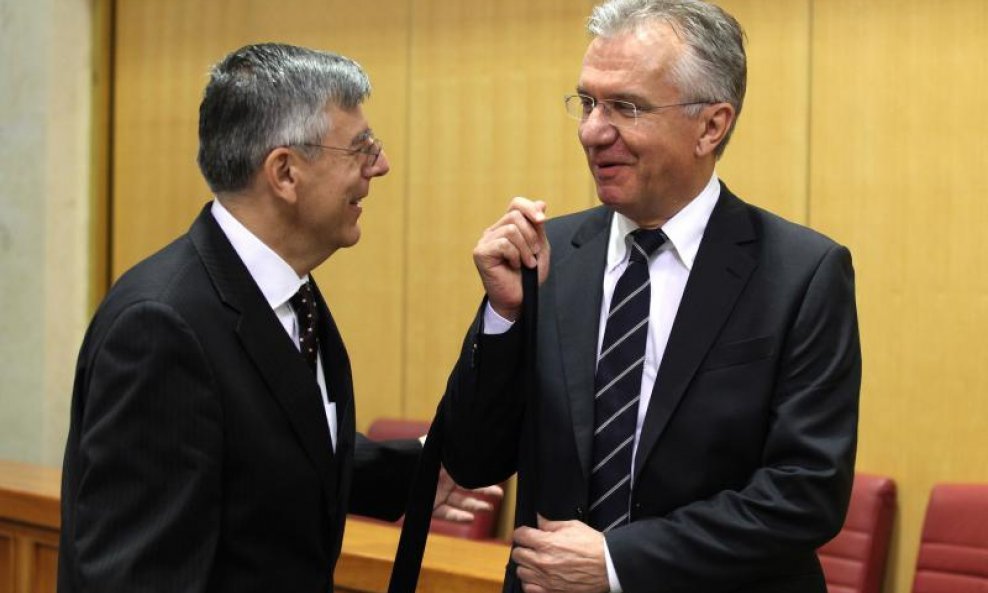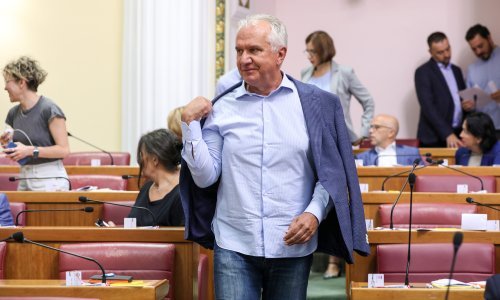The ruling majority and the Opposition in Parliament on Wednesday voiced different positions on the government-sponsored bill on medically assisted human reproduction, with differences in their world views manifesting themselves again as in previous debates on the bill.
Introducing the bill earlier in the day, Health Minister Rajko Ostojic said he was proud of the bill because it would enable women and couples undergoing infertility treatment to access the latest technologies of assisted reproduction.
Ostojic said the bill was based on six principles, including the principle of optimal treatment in line with the best European practices, the principle of choice with women and couples having at their disposal six different types of therapy, the principle of protection of mother's and child's health in all stages of treatment, the principle of accessibility, enabling infertility treatment in Croatia, and the principle of participation of patients' associations in the national commission for medically assisted human reproduction.
The bill makes methods of medically assisted reproduction available to married and unmarried couples and working-age women who are not married and do not have a partner, whose previous infertility treatment has been unsuccessful.
Under the bill, the preferred method of medically assisted reproduction is homologous fertilisation (using one's own germ cells), while heterologous fertilisation (using a donor's germ cells) is used when it is not possible to use the patient's own germ cells or for the sake of preventing serious hereditary diseases in the child.
The egg cell donor is a woman whose egg cells are used with her consent in the artificial fertilisation of another woman, as well as a woman taking part in a procedure of medically assisted reproduction where surplus egg cells have been produced.
The sperm donor is a man whose semen is used with his consent for the artificial fertilisation of a woman other than the woman who is his wife or common-law partner.
Embryo donors are married couples or partners living in common-law marriage who have decided not to use their own embryo and given permission to donate it.
Germ cells, tissues and embryos may be stored (frozen) in centres for medically assisted reproduction, with the consent of the persons from whom they have been taken, for a period of up to five years, which can be prolonged by five more years at the request of those persons.
The bill provides for the fertilisation of 12 egg cells. Two embryos may be returned to the woman's uterus. In cases when the woman is older than 38 and has not become pregnant with the help of any method of artificial fertilisation, all egg cells may be fertilised and three embryos may be returned to the woman's uterus. The other embryos are frozen.
Upon turning 18, a person conceived and born with the help of artificial fertilisation has the right to learn all information about their biological origin, including information on the donor's identity.
Davor Ivo Stier of the Croatian Democratic Union (HDZ) said the bill was discriminatory "because it renders some children fatherless at the very start," prompting a response from Igor Kolman of the Croatian People's Party (HNS), who called on MPs not to fall for what he called "empty arguments" on children's right to a mother and a father.
"Of course children should have (both parents), but what gives us the right to say that they should not have been born," Kolman said, mentioning in that context children of single parents and children without parents.
"Who gives you the right to use the law to make children fatherless when they have a right to a father," HDZ MP Jadranka Kosor said, adding that she had grown up without a father and felt disadvantaged her whole life because of it.
Zoran Vinkovic of the HDSSB, too, said children should have the right to both parents.
"Father, mother and child are the foundation of society and civilisation and that cannot be compared with single parents," he said, to which Kolman replied that people were free to live by their own religious and cultural views in the privacy of their homes, but that they did not have the right to impose them on others.
"We are not priests, we represent citizens and should ensure all civil freedoms," Kolman said, adding that the bill would also have a positive impact on the national population policy.
Igor Dragovan of the Social Democrats said the bill reflected a responsible policy towards society and citizens, enabling infertility treatment without causing any major controversy.
He recalled that the ruling centre-left coalition had been given the mandate in parliamentary elections to provide for infertility treatment in line with the most modern methods and with the possibility of choice.
Zeljko Reiner of the HDZ said his party would not support the bill because of its world view, as well as because of a number of shortcomings in the text of the bill which he said gave reason for suspicion about possible abuse and manipulation as well as legal insecurity.
He added that all religious communities in Croatia were against the government's bill.
This prompted replies from a number of MPs of the ruling coalition, who said that Croatia was a secular state separated from the Church. "Our job is to make secular laws," said HNS deputy Kolman.
Health Minister Ostojic commented on Reiner's claim that the bill did not regulate well what happens with embryos and that there was no register of frozen embryos. "The freezing of embryos started in the 1990s, you know who was Health Minister at the time, and such a register did not exist."
Dinko Buric of the HDSSB warned against ignoring the position of church circles on the bill, finding it disputable that unmarried women and women without a partner could undergo infertility treatment, as well as that artificial fertilisation procedures often involved destruction of embryos. He added that surplus embryos were used in experiments and treatment procedures with stem and embryonic cells.
Nansi Tireli of the Croatian Labour Party said her party supported the government's intention to help couples undergoing infertility treatment have access to modern medical procedures, but warned that in some segments the bill was not complete and gave reason for suspicion.
She also opposed the regulation under which children conceived and born with the help of artificial fertilisation would have the right to learn all information about their biological origin, including information on the donor's identity, upon turning 18.
The bill was supported by the Independent Democratic Serb Party (SDSS), but its deputy Vojislav Stanimirovic described as contentious the regulation on the freezing of embryos, notably the fate of frozen embryos that have not been returned to the woman's uterus after five years.


































